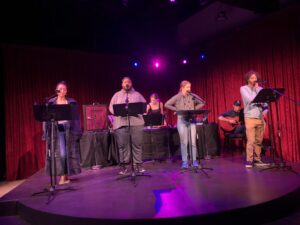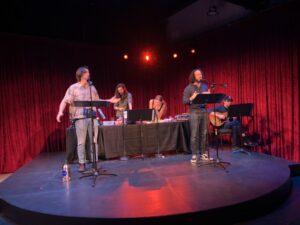But in an intriguing series of initiatives on secondary stages in byway venues (including bars and breweries), the community of practice regularly coalesces to give developing playwrights and stage artists a place to germinate and grow. In the Triangle area alone, programs from Sips & Scripts, Cary Playwrights’ Forum, Odyssey Stage, the North Carolina Playwright’s Lab at Capital Arts Theater Guild, and UNC’s Process Series all offer public forums for artists from beginners to professionals.
Local playwrights coming out of them have not only seen their work performed at NC Stage, PlayMakers Rep, and the now-shuttered Triad Stage; their work has earned favorable reviews from the New York Times and been produced off-Broadway and on the West Coast.
Artist Soapbox, producer/playwright Tamara Kissane‘s long-running theater podcast series, and Capital Arts Theater Guild have collaborated on two such forums in the last two years, devoted to the subgenre of audio drama, under the title ASBX Live.
In the 1930s and ’40s, audio dramas ruled the airwaves in radio serials including The Shadow, Gunsmoke, and thrillers like Arch Oboler’s Lights Out. In recent years, a myriad of podcasts, including Welcome to Night Vale, have revived the genre. Still, many forget that, between those two eras, works by Samuel Beckett and Harold Pinter, as well as Dylan Thomas‘ famous “play for voices” Under Milk Wood, were originally radio dramas written for broadcast on BBC Radio 3.
Last spring, ASBX Live put out an open call to Triangle playwrights, soliciting original one-act audio dramas. Writers had to meet requirements for time and personnel, with a maximum of 25 minutes, and a cast no greater than four. Scripts had to substitute sound effects for stage direction, and they had to respond to a theme – this year, “Home Sweet Home.” Winners would receive a $100 honorarium and have their works produced.
Last Saturday night, playwrights Teddy Durgin and Allan Maule heard – and saw – their winning scripts performed before a live audience in a festive showcase featuring live music and intermission sets by the Durham improv comedy troupe Mettlesome.
The Lobby Cabaret Theater, tucked in at one end of Theatre Raleigh‘s entrance hall, had the air of an after-hours club as a crowd of theatrical insiders filled in at the constellation of cocktail tables arrayed around the stage and draped themselves along the casual upholstery scattered ad hoc across the space. Word was still breaking about North Carolina Theatre’s abrupt closure the day before, and the bar was doing brisk business. It seemed a group in need of a drink, a good time – and a Saturday night off for a change.
All three were available here.
In her eye-popping coat of many colors, bright and buoyant host Susan Jordan Shank set the tone with a solid, knowing rendition of “Somewhere That’s Green,” that sweet/sour tribute to middle-class, middle-brow domesticity from Little Shop of Horrors. (Guitarist Michael Kennedy provided tasteful, nuanced accompaniment throughout the evening, including Melvin Gray Jr.‘s soulful after-intermission take on “Home” from The Wiz.)
When audio dramas are performed live, there’s still plenty to look at; the effect, overall, is like a staged reading, but with extra props. While sets were swapped out for music stands and microphones, actors vividly interacted with one another, selling their lines with topspin and true emotion, since the podcast audience, who will hear these works later on this year, will see none of this. In their midst, Foley designer Cameron Fitzpatrick and assistant Krystin Bailey lurked behind a table filled with random accoutrements used to generate sound effects. A single shoe, incongruously resting on a deep layer of corn flakes in a glass baking tray? That made the sound of a character walking across gravel, while two beers being opened by two characters were…actually two beers, pop-topped, on mic, on cue.

Julia Valente, D.J. Brinson, Foley artist Krystin Bailey, Ali Evarts, guitarist Michael Kennedy and Liam Yates in “Jane Gets Sent”
In Allan Maule’s domestic slice-of-lifer The Wellerdads, Doug (Chris Hinton), a stay-at-home dad, is drowning in self-doubt as his attempts to become a viral comedian and influencer on YouTube – and earn the admiration of his son – are seriously circling the drain. When he enlists the creative help of his college friend Matty (Kenny Ortiz) on a play date with his two kids (adorably voiced – through odd contortions – by Foley artists Fitzpatrick and Bailey), tempers rise, frustrations ensue, and children learn some colorful new vocabulary as well.
Director David Henderson gets rich performances from well-seasoned actors in both one-acts, and the late-night atmosphere lends a genial air to the proceedings.

Kenny Ortiz, Foley artists Cameron Fitzpatrick and Krystin Bailey, Chris Hinton and guitarist Michael Kennedy in “The Wellerdads”. Photo Credits: Charlie Brady and Tamara Kissane
Ultimately, though, both scripts seem truncated. Either of the two major premises in Durgin’s script – the introvert’s heaven and the real low-down from former pets – are generous enough for a full one-act apiece. We similarly get the feeling that Maule’s true-to-life dads are just getting into a groove when the time bell rings.
In both cases, it’s hard not to conclude that ASBX Live gave the playwrights a living theatrical sketchpad, one on which to work out a series of interesting opening moves with imaginative themes that we’d strongly encourage both to pursue. Performers who were clearly having a good time got a good workout in a brief project where they got to focus only on vocal acting. And a crowd of theatricals still reeling from the week’s news got a chance to unwind in a night of fellowship, one spangled with wit and savvy, easy-stakes showmanship: a three-way win, in short.











